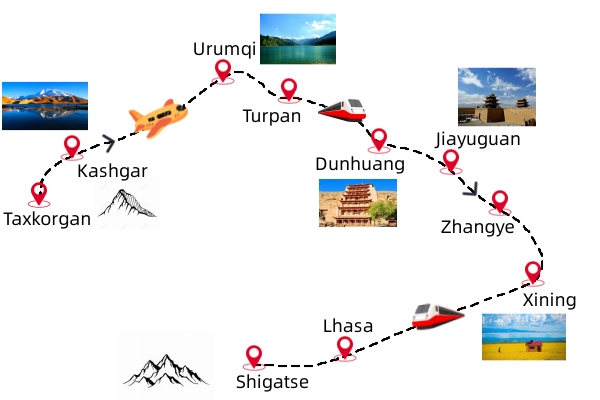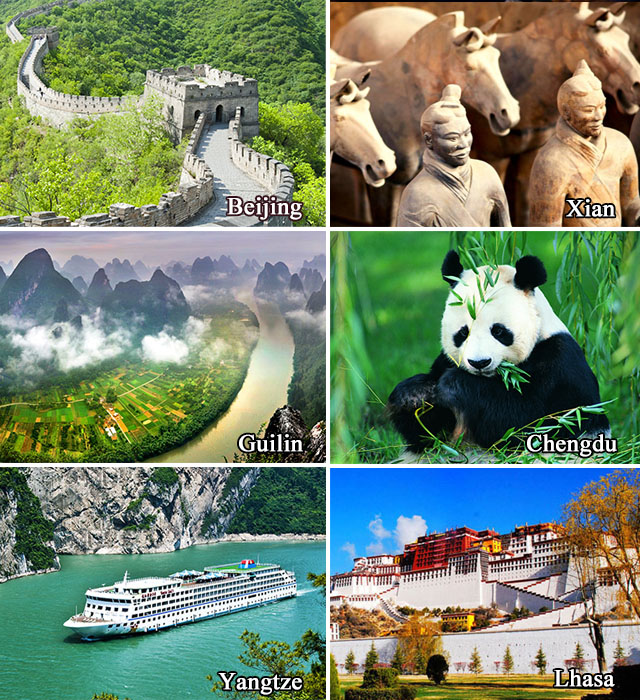20 Top Facts For Picking China Tour Websites
20 Top Facts For Picking China Tour Websites
Blog Article
Top 10 Tips To Shop In China Regional Specialties
1. Research Before you GoTip - Know what each area is known for. For instance, Suzhou for silk, Jingdezhen for porcelain and Tibet for thangka paintings.
Pro: You can focus your energy on shopping, and you'll save time.
Con: A good understanding and preparation of regional highlights is required.
2. Buy Local to Ensure Authenticity
To ensure authenticity and high-quality To ensure authenticity and quality, buy products directly from the original point.
Pro: Reduces the chance of copyright products and helps local artisans.
Cons Pros: Travel to rural or less touristy regions may be necessary.
3. Explore the Workshops and Artists.
TIP: Try small workshops or artisan hubs instead of the usual shops.
Pro: Provides better understanding of craft and guarantees that you are buying directly from the creators.
Pro: Handmade products can be more expensive and more difficult to purchase.
4. Be aware of cultural meanings.
Learn about the cultural history behind such objects like jade carvings and calligraphy scrolls.
Pro: Enhances the value of your purchases and enhances your appreciation for them.
Pro: Could require some time to grasp all the cultural nuances.
5. Check for Quality
To ensure that you are happy with the quality, examine things like ceramics, tea or embroidery are up to your standards.
Pro: You get what you have paid for.
Cons: Some knowledge is required to recognize quality products.
6. Beware of products that are mass-produced.
It is important to look for products that are original and handcrafted rather than mass produced replicas.
Pro: You'll bring back a highly valuable and unique souvenir.
Con The truth is that genuine craftsmanship is typically more expensive and harder to find.
7. Compare Prices
Shop around to find the best prices for the item you are looking for.
Pro: It can help you to identify reasonable prices and avoid being overcharged.
Con: It can be time-consuming in large markets, especially.
8. Teas from trusted suppliers
Tip For regions such as Hangzhou or Fujian Go to trusted tea shops for Longjing (Dragon Well) or Tieguanyin teas.
Pro: It guarantees quality and authenticity.
Con: Teas of premium quality can be costly and hard to confirm for newcomers.
9. Local Customs Learn about them
You might be required to bargain in some areas.
Pro: It adds a fun culture to your shopping.
Con: A misunderstood view of the rules and customs can result in awkward interactions.
10. Pack Smartly
Make preparations for the transport of bulky and fragile items like ceramics, silk or other regional specialty items.
Pro: Prevents damage and ensures your purchases arrive safely.
Cons: Can create logistical challenges and add costs to shipping.
The benefits of shopping for Regional Specialties
Unique Souvenirs.
Cultural Immersion. Buying local specialties will help you connect to the region's heritage and workmanship.
Support for artisans Direct purchases made from artisans help local economies.
Pros and cons of shopping for local specialty foods
Genuineity Risks: The danger of buying lower-quality or imitation versions.
The transportation of heavy, fragile or bulky objects can be difficult.
Higher Costs: Genuine regional products can be expensive particularly handcrafted items.
Use these suggestions to ensure you make meaningful and lasting purchases during your journey to China. Follow the best find everything you need to know about this site for website info including the top 4 movies about kung fu and chinese culture, the color of dress in china, eating in guilin, tours for the disabled, eating in guilin, shaoxing wine the best yellow wine in china, chinese wood carving originated in neolithic period, eating in urumqi, entertainment in beijing, binhai aircraft copyright theme park in tianjin and more.
Top 10 Tips On Seasonal Visits When Visiting Famous Temples In China
1. You can visit during the off-season typically from November until January. The weather is cooler and there will be fewer visitors.
Pro: Less crowds. Provides a serene and contemplative atmosphere.
Cons: It may be colder and uncomfortable visiting temples in the cold.
2. Prepare yourself for extreme weather
Tips: Temperatures vary drastically in the different seasons. Winters may be bitterly cold, however summers can be scorching. Prepare for the weather.
Pro: You'll be prepared for any type of weather, and be comfortable during your stay.
Con Cons: Packing for seasonal extremes can be a hassle, particularly when you're traveling in a small amount.
3. Visits to Vibrant Flora in the spring and Summer.
Tip: Visiting temples in spring and summer allows you to witness stunning gardens, flowering flowers and lush landscapes surrounding the temples.
Pros: Beautiful landscapes add to the overall experience of touring the grounds of the temple.
Con: Summers can be hot and packed on holidays, particularly national ones.
4. Think about festivals and other special events.
Plan your travel around festivals such as the Mid-Autumn Festival or Chinese New Year. These seasons are full of ceremonies, celebrations and the chance to see the temple's vibrant culture activity.
Pros: There are a lot of temples that offer traditional and exciting activities. This is a great way to experience a new worldview.
Con: During the festival season temples may become very busy and accommodation costs may increase.
5. Beware of Peak Holiday Seasons
Avoid visiting during tourist-busy times like Chinese New Year, Golden Week, or the Golden Week of October, when temples may be overcrowded.
Pro: More tranquil experiences without crowds, giving a more spiritual and peaceful experience.
Pros: Some important events can be skipped during busy times.
6. Be sure to check for winter Temple closures.
Tips: Some temples might have limited hours or be closed during the winter months, especially in remote areas or northern regions. Always verify in advance.
It helps you avoid unnecessary journeys, and lets you plan your other things to do.
Con: Some temples might have reduced hours or completely closed during improvements, which could lead to disappointment.
7. Early Morning Visits to the Beach in the summertime
Be sure to arrive early so that you can avoid the noon sun's heat. Many temples are open in the morning as there are fewer visitors and there is less heat.
Benefits: Enjoy peace and quiet without the noise of.
Cons: A early wake-up time is required, which might not be suitable for everyone.
8. Be prepared for rain in the summer months.
In the southern part of China the region of southern China, heavy rains may be experienced during summer. Pack an umbrella and rain gear to take with you during this period.
Pros: You will be able to enjoy the temples' beauty, even when it rains.
Con: The rain can cause disruption to outdoor activities and leave the grounds of temples slippery.
9. Visit temples within the Mountainous Areas in Autumn
Tip: The autumn foliage provides a stunning backdrop for temples in mountains (e.g. Mount Wutai and Mount Emei), as it is a time when the weather is nice.
Pro: The views and cooler temperatures make outdoor exploration and hiking more enjoyable.
Con: Mountain temples that are well-known can still draw crowds, particularly on holidays and weekends.
10. Make use of the Lunar Calendar to Plan Specific Events
Tips: Many temples adhere to the lunar calendar of China Some ceremonies or events are linked to certain dates. The calendar can be used to plan your itinerary and also attend important events like the Lantern Festival or Buddha's birthday.
Pros Unique cultural experiences as well as a greater understanding of the local practices of spirituality.
Cons: The lunar calendar may force you to plan your trip more carefully and may not match up with events taking place at the moment.
Benefits of visiting Chinese Temples Seasonally
Fewer Crowds: Off-season visits offer a more peaceful and contemplative experience.
Festivals: Cultural festivals provide the chance to know more about local customs that are both cultural and religious.
Beautiful Scenic Beauty. The seasons of spring and autumn are great times to enjoy stunning landscapes. The vibrant gardens surrounding temples are another great alternative.
Cooler Weather: Winter and autumn are the best times to go temple exploration.
Pros and Cons of Seasonal Chinese Temple Visits
Uncertain Weather: Winter could be cold, while summer could be too hot, which could impact your comfort.
Temple Closures: Some temples will close during extreme weather, or when they operate with restricted hours.
The Temple Can Get Crowded: Festivals and holidays that are popular can attract huge crowds. This can make it hard to experience the peace and tranquility in the temple.
Limited Activities - Some ceremonies and events are only scheduled during specific seasons.
You can make your trip to the temples of China more enjoyable and meaningful by selecting the right time of year and plan ahead. Understanding the changing seasons will assist you in getting the most enjoyment from your trip, whether you want peace and quiet or cultural celebrations. View the recommended explore this amazing destination for more examples including popular beijing night markets, xiang cuisine.html, shopping in harbin, entertainment in hong kong, wang zhaojun one of the four beauties in ancient china, hohhot transportation, honey lake country club, chaotianmen dock%EF%BC%8C a major water transportation hub in chongqing, shopping in macau, luoyang peony and wangcheng park and more.